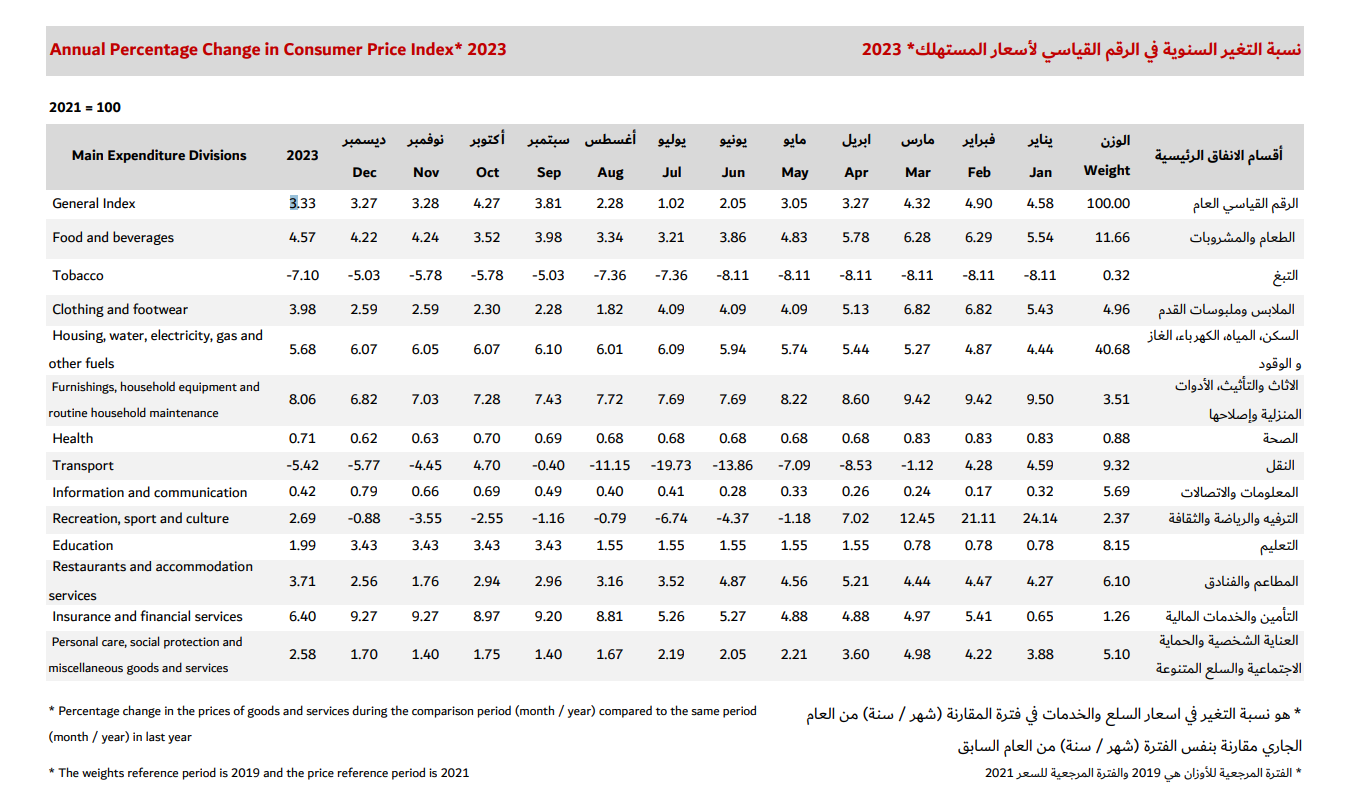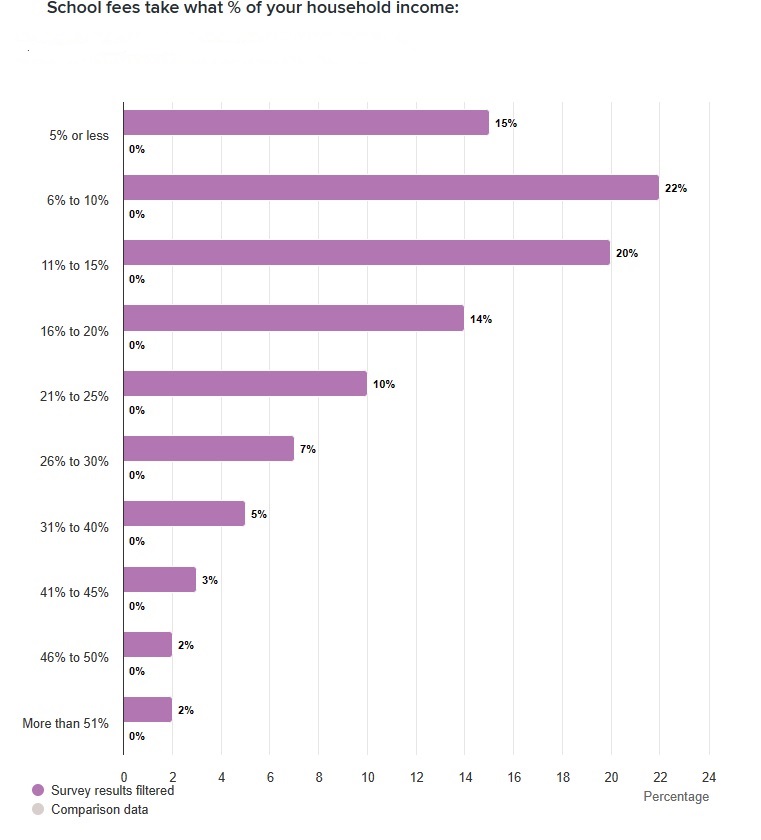Following the announcement that Dubai school fees are set to rise by up to 5.2% for the 2024/2025 academic year, some parents have said they are worried about their household budgets at a time when costs are rising across the board.
There was an overall 3.3% rise in the cost of living in 2023 compared to 2021, according to official Dubai government statistics. The largest rises were in areas that most affect parents, including food and beverages (a 4.57% rise in 2023), clothing and footwear (3.98%), education (1.99%) and housing and utilities (5.68%). These rises are average – in reality many families have seen increases in accommodation costs in double figures, leaving some no choice but to move area – and potentially, in some cases, pondering moving schools to manage commuting distances.
The trend is continuing in 2024, with even higher cost hikes reported in January and February so far this year.

Data from Digital Dubai
School fees represent one of the largest outlays for many Dubai families, with 19% of parents saying they invest between 25% to more than 50% of their household income on their child’s education, according to an EdStatica.com survey of more than 10,000 Dubai parents. However, the situation is less severe for other families, with the majority of respondents (22%) in the same survey stating that they invest a more manageable 6% – 10% of their household income on school fees.

Edstatica.com data on Percentage of Household income that school fees represent for Dubai parents
Nevertheless, this latest hike in school fees comes at a time, as above, when parents are already grappling with significant rental increases, which has seen the average rent in Dubai increase by a whopping 22%, according to a report by real estate service CBRE.
Social media forums have been ablaze with mixed views regarding the rising school fees news, with one parent commenting:
“Why is everything rising in cost except wages?”
Although salary surveys suggest that most UAE companies (53%) plan to raise salaries in 2024, more than one-fifth (21%) of UAE companies said they plan to lower their employees’ salaries this year, according to a 2024 salary guide by recruiters Cooper Fitch.
These statistics reflect the variability in the market, and how school fee rises can affect different families with significantly varying degrees of severity.
This highlights the importance of there being more affordable school options in Dubai, as well as the need for increased numbers of scholarships and bursaries in the emirate for those parents who may fall into financial hardship.
In 2023, SchoolsCompared.com introduced an award for the Best School in the UAE for Scholarships, Bursaries and Care for Parents, to encourage schools to commit to providing for students from all financial circumstances, and to provide a formally recognised safety net for current families who might fall into financial hardship.
We are yet to see a Dubai school that has successfully implemented a formalised bursary offering, although many schools do offer scholarships. Although bursaries are similar to scholarships, they are distinct in the sense that scholarships are generally only for students who excel in a certain area, regardless of their family’s financial means. Bursaries are only for those families whose circumstances mean that they would benefit from financial assistance.
Why are schools raising their fees?

The decision regarding whether Dubai private schools may raise their fees is determined by the KHDA, the Dubai schools’ regulator, and is based on the Education Cost Index (ECI), which is calculated in collaboration with Digital Dubai Authority. The ECI measures annual changes in the costs of running a school, including salaries, rent and utilities, and is based on the annual audited financial statements of private schools in Dubai.
If the ECI is negative – as it has been in previous years – this means that the data suggests that school costs have stayed the same or gone down and so school fees are frozen. While this is good news for parents, it can of course take a strain on schools’ ability to invest in their own staff and facilities, as explained here.
This year the ECI has been set at 2.6%, meaning that the data suggests Dubai schools’ costs increased by this amount in the past year. Schools may now raise their fees based on calculations tied to their inspection rating and regulated by the KHDA’s School Fees Framework.
It is important to note that the KHDA School Fees Framework means that 5.2% is the maximum amount that any school can raise their fees, which only applies if the school’s inspection rating has risen from Very Weak to Weak; Weak to Acceptable; or from Acceptable to Good. For all other schools the rise will be less, on a sliding scale that gradually reduces based on performance and prior rating. Schools that have dropped down in their rating will not be eligible to raise fees at all. The new ratings for the academic year 2023/24 are due to be released by the KHDA imminently.
What Advice is there for Struggling Families?

Ultimately, if a family’s costs are not keeping up with their income, then something has to give. For families where children are settled happily in school, the last costs to be looked at are school fees – no one wants to disrupts a child’s education by moving school. This said, increasingly families are looking to change schools, often because increasing accommodation costs mean that they are already looking at moving out of area.
Schools do not want to lose their students. Although demand is high, particularly in wealthy areas driven by new demand, schools do feel responsibility for their families. It is not a matter of schools not caring if they lose a family on the basis that any family can be replaced. But they also need to look after their teachers – and ensure that their schools are maintained. There are no easy answers here.
The first port of call must be employers. It is in their interests not lose their staff. But if you are going to ask for a pay rise, you need to be prepared to justify it, both on the basis of performance, but also on the basis of increased household costs – including school fees. Go armed to any meeting with evidence, including school fee increase letters from schools. Many employees will be more understanding if they can see evidence that requests for salary increases are not arbitrary.
Finally, if all fails, you do need to set up a meeting with your school. Again, you need to go to any meeting with evidence, including, for example, a letter from an employer refusing an increase in salary. Be positive. Many schools do have limited funds set aside to help families in crisis. Be aware, however, that these funds are almost always very limited and short term. All schools, ultimately, are run by teachers and school leaders that are educationalists – they have chosen this career as a vocation to help children. They will always do whatever they possibly can to assist – but never cry wolf and always help them to understand your circumstances with clarity.
What all families must avoid is borrowing unsustainably or putting heads in the sand – however appealing this may be when faced with the considerable pressures of cost of living increases each year.
Positively, if it does become necessary to move school, the number of high performing schools in the Emirates is increasing annually. Parents really do have choice now. Things in life do happen for a reason – and it may well be that the new school you move to is the school that gives your children opportunities that would never have been possible at their old school. The level of fees does not define, or guarantee, how good any school will be for any individual child. Never leave it too late. The end of the school year is approaching – and the new academic year is far and a way the best time to be changing your child’s school.
© SchoolsCompared.com. A WhichMedia Group publication. 2024 – 2025. All rights reserved.




































































Leave a Response